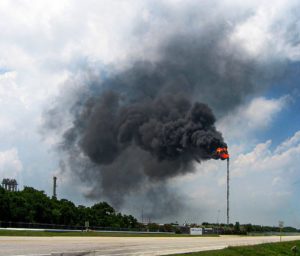Texas ExxonMobil Oil Refinery Engulfed in Flames Amid a Suspected Explosion, Resulting in Injuries
Quick Links
- What does an oil refinery do?
- What happened at the ExxonMobil oil refinery in Texas?
- Dangers of Oil Refineries
- How many people were injured or killed at the Texas ExxonMobil oil refinery? 1
- Who’s liable for the injuries and deaths resulting from this incident?
- Were the injuries at the ExxonMobil oil refinery preventable?
- What should you do if you or a loved one suffered injuries or death due to the incident at the Texas ExxonMobil oil refinery?
- Our Texas Personal Injury Attorneys
Many are assuming an explosion left an ExxonMobil oil refinery in Texas in chaos, injuring several people and setting the area ablaze in the early morning hours on Thursday, December 23, 2021. An investigation is ongoing to determine the events that led to a fire breaking out at the major industrial plant around 1 a.m. CT. Emergency personnel transported four people to the hospital, where they are currently in stable condition. It’s unknown at this time if ExxonMobil may be liable for their injuries or any other injuries or deaths resulting from this incident happening just two days before Christmas.
What does an oil refinery do?
An oil refinery is an industrial process plant employing scientists, engineers, and safety professionals who aim to turn crude oil or petroleum into useful products for our everyday life. These valuable and necessary commodities include gasoline, diesel fuel, other fuel oils, kerosene, asphalt base, liquefied petroleum gas, and heating oil.

Oil refineries essentially carry out the second stage of the crude oil production process, with the first stage being extraction. The second step serves as an important part of the midstream oil and gas industry. Upstream involves the surveying and drilling, and downstream includes distribution and sale. Without processing or refining, including separation (distillation), conversion (involving chemical processes), treatment, and blending, crude oil is not useful for various operations, such as transportation and other activities requiring fuels, and therefore, would be worthless in retail establishments.
Major refineries can process hundreds of thousands of barrels of crude oil each day. Overall, across all refineries in the U.S., these plants process approximately 17 million barrels of crude oil daily. According to the U.S. Energy Information Administration (EIA), a refinery can derive 19-20 gallons of automotive gasoline, 11-12 gallons of distillate fuel (mostly sold as diesel), and four gallons of jet fuel from a 42-gallon barrel of crude oil. These vital plants also produce over a dozen different types of petroleum products and liquids used to make various chemicals and plastics.
The U.S. saw a slight drop in oil production following the start of the COVID-19 pandemic. Other variables, including natural disasters (e.g., hurricanes) and occurrences like the Texas ExxonMobil oil refinery fire, can also affect crude oil production, making the sustainability of these plants of paramount importance to avoid a drop in the number of available goods, helping to regulate supply and demand.
What happened at the ExxonMobil oil refinery in Texas?
The events leading up to the Texas ExxonMobil oil refinery fire are still under investigation, but many are pointing to a suspected explosion. NBC News reported that Harris County Sheriff Ed Gonzalez stated that initial reports suggested “some type of explosion” at the Baytown oil refinery, but Rohan Davis, a refinery manager at the industrial site located 25 miles east of Houston, could not confirm that allegation.
Deputies are on scene of a major industrial accident at 3525 Decker Dr. in Baytown. The Exxon/Mobile plant. Some injuries have been reported. Please avoid the area.#hounews
— HCSOTexas (@HCSOTexas) December 23, 2021
Despite Davis’s inability to conclude a definite explosion as the ultimate culprit for the fire, many nearby residents described what they said felt like an earthquake. Sarah Martinez told the news station that it felt like “a wave.” Martinez lives directly across from the plant and said the impact knocked down all her pictures in her living room.
Another witness who lives about two miles away said she thought it was “a bomb.” The rumble that followed shook her windows, A/C unit, and television. She said it reminded her of a prior explosion at the facility in 2019, but she described this one as being “louder and bigger.” Other residents shared their concerns on Twitter, also likening what they heard and felt to an explosion.
According to Reuters, what’s currently known about the fire is that it originated in a hydrotreater unit that the site had shut off on Wednesday (one day before the ignition) due to a bypass line leak. These units help remove sulfur and other contaminants to make various fuels, including automotive gasoline. Those injured were working to repair the leak when the fire broke out.
The Baytown ExxonMobil oil refinery has a chemical and olefins plant, processes approximately 560,500 barrels of crude oil per day, and employs roughly 7,000 people. Reuters stated it’s “one of the largest refining and petrochemical facilities in the United States,” covering 3,400 acres and ranking fourth for operations and production capacity. It’s unknown how long ExxonMobil might need to pause operations at the impacted units. Additionally, there are allegations that Exxon is reducing production rates at other Baytown processing units to focus on stabilizing those affected, which could possibly result in shortages of fuel and other materials.
Baytown is home to about 75,000 people, but evacuations never took place, with Gonzalez confirming such measures were unnecessary. The incident was visible to surrounding residents as a billowing cloud of black smoke emitting from the flames at the oil refinery. Authorities ordered residents to shelter in place and told them to close windows and doors and turn off A/C units to limit smoke exposure. The fire continued to blaze until about 10 a.m. ET (several hours after it began) when firefighters were finally able to extinguish it.
Dangers of Oil Refineries
Oil refineries can be dangerous places to work due to petroleum being a highly flammable substance. The naturally occurring yellowish-black substance found in sedimentary rock formations below the Earth’s surface is a hazardous and combustible liquid because of its chemical makeup. Fires and explosions are always a primary risk when working with such corrosive materials.
In addition to fire risks, air pollution and direct exposure to toxic chemicals also account for several dangers of working in or living nearby an oil refinery. People in the vicinity of these industrial plants can inhale large quantities of chemical compounds, such as ethylbenzene, xylene, benzene, and toluene, resulting in harm, including cancer, birth defects, and chronic respiratory conditions like asthma.
In May 2021, Liquid Health News reported on the Environmental Integrity Project (EIP) findings that 13 U.S. oil refineries released benzene in concentrations exceeding federal limits the previous year. Lower socio-economic groups and Black and Hispanic populations are disproportionately affected by these emissions, necessitating action by the Environmental Protection Agency (EPA) in 2015 to require continuous air monitoring at oil refinery fence lines to protect surrounding communities. Benzene is a well-known cancer-causing substance that harms cell processes and destroys immune systems, resulting in an increased risk of infections and chronic illnesses.
Within plant confines, industrial safety equipment is essential to protect oil refinery workers from breathing in chemical gases and avoid various toxic materials from contacting their skin. Acids, such as hydrofluoric acid used to make high-grade gasoline can cause scarring injuries to those handling the substances. Protective jackets, bibs, gloves, and goggles help safeguard workers at oil refineries from encountering caustic liquids. Photo: Jim Evans, CC BY-SA 4.0, via Wikimedia Commons
How many people were injured or killed at the Texas ExxonMobil oil refinery?
According to Gonzalez, at least four people suffered injuries stemming from the incident at the ExxonMobil oil refinery in Baytown, Texas. The flames that broke out at the industrial plant caused three individuals to sustain injuries, requiring air ambulance transportation to a nearby hospital. Paramedics also transported a fourth person by ground.
At 5:30 a.m. ET news conference, Davis said the individuals hospitalized were in stable condition, and they were able to account for all facility personnel. Deputies with the Harris County Sheriff’s Office confirmed the reporting of “some injuries,” but no deaths have occurred at this time. Reuters reported that the incident resulted in injuries to 37 workers.
Who’s liable for the injuries and deaths resulting from this incident?
Although the exact cause of the incident is still under investigation, Exxon Mobile Corp is cooperating with authorities to deliver answers to the public. ExxonMobil isn’t yet accepting blame, but a spokeswoman for the company, Sarah Nordin, issued a statement saying: “We deeply regret any disruption or inconvenience that this incident may have caused the community.”
Nordin also alleged that available air monitoring information from the plant showed no adverse impacts to surrounding air quality. Additionally, she confirmed that the fire burned residual fuel in the unit shut down the day before and that firefighters were able to contain the impact to that chamber. No one has yet to confirm how or why the fire started.
If authorities determine that ExxonMobil acted negligently or wrongfully in its operations or maintenance at its Baytown facility, it may be liable for resulting injuries or impacts to the community and could be subject to lawsuits.
Were the injuries at the ExxonMobil oil refinery preventable?
Technical reference documents titled Environmental, Health, and Safety (EHS) Guidelines set general and industry-specific examples of Good International Industry Practice (GIIP). Due to the substance’s volatile nature, a separate EHS Guidelines for Petroleum Refining covers various industry standards for processing crude oil to finished products. The expected measures implemented by these guidelines include considerations for emissions, routine cleaning and maintenance, venting and flaring, and other techniques to prevent harm.
Additionally, the Occupational Safety and Health Administration (OSHA) has its own industry-specific recommendations and mandatory regulations to recognize and avoid hazards likely to cause serious injury or death. Lastly, Texas has laws regulating specific businesses and occupations dealing with natural resources, such as petroleum.
State and federal officials and experts create these safety standards, rules, and regulations to prevent accidents and injuries. If Exxon failed to adequately follow the necessary safety measures, the damages resulting from the Baytown oil refinery incident were likely avoidable had the company implemented and enforced all legal industry requirements.
This particular facility previously experienced an explosion and subsequent fire in July 2019, necessitating medical evaluations for more than 60 people and the issuance of a shelter-in-place order for approximately 5,000 affected individuals. Prior to that incident, in March 2019, another fire at the Baytown oil refinery was extinguished within hours but contaminated the surrounding air for eight days.
Harris County previously sued ExxonMobil for alleged violations of the federal Clean Air Act.
What should you do if you or a loved one suffered injuries or death due to the incident at the Texas ExxonMobil oil refinery?
If you or a loved one suffered an injury due to the Texas ExxonMobil oil refinery fire, you might be entitled to compensation. It’s important to contact an attorney to discuss possible legal recourse and determine your available options for financial recovery to aid in your healing.
At Meirowitz & Wasserberg, our attorneys have a reputation for excellence, and we aim to hold those parties responsible for others’ harm accountable for their negligence or wrongdoing. We work for you on a contingency fee basis, meaning you don’t pay us anything unless we get you compensated, giving us the incentive to succeed on your behalf. We have recovered many significant settlements and awards for our clients suffering personal injuries.
Contact us today for a free consultation.
Our Texas Personal Injury Attorneys















